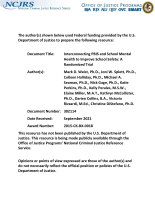Randomized controlled trials
Long-Term Follow-Up of the National Evaluation of Gang Resistance Education and Training Project
Sustained Impact on Parenting Practices: Year 7 Findings from the Healthy Families New York Randomized Controlled Trial
The impact of drug court participation on mortality: 15-year outcomes from a randomized controlled trial
Analysis of Alternative Light in the Detection and Visibility of Cutaneous Bruises
Study Protocol: A randomized controlled trial of suicide risk reduction in the year following jail release (the SPIRIT Trial)
Effectiveness of a social problem solving training in youth in detention or on probation: An RCT and pre-post community implementation
Interconnecting PBIS and School Mental Health to Improve School Safety: A Randomized Trial
Building Trust Inside and Out The Challenge of Legitimacy Facing Police Leaders
In the face of budget cuts, changing workforce demands, new varieties of crime and new technologies, how should police executives manage officers and other personnel and still ensure that organizational goals are being met?
Drawing on new data from a national sample, Dr. Dennis Rosenbaum, Director of the Center for Research in Law and Justice at the University of Illinois, Chicago, discussed the latest findings...
A randomized-control trial testing the impact of a multidisciplinary team response to older adult maltreatment
Improving Hot Spot Policing through Behavioral Interventions
Trauma in Schools - Roundtable Discussion, NIJ Virtual Conference on School Safety
On February 16-18, 2021, the National Institute of Justice hosted the Virtual Conference on School Safety: Bridging Research to Practice to Safeguard Our Schools. This video presents a roundtable discussion from the conference.
See the YouTube Terms of Service and Google Privacy Policy
Preparing for and Responding to Threats and Violence - Breakout Session, NIJ Virtual Conference on School Safety
On February 16-18, 2021, the National Institute of Justice hosted the Virtual Conference on School Safety: Bridging Research to Practice to Safeguard Our Schools. This video includes the following presentations:
See the YouTube Terms of Service and Google Privacy Policy
Alternatives to Traditional School Discipline - Breakout Session, NIJ Virtual Conference on School Safety
On February 16-18, 2021, the National Institute of Justice hosted the Virtual Conference on School Safety: Bridging Research to Practice to Safeguard Our Schools. This video includes the following presentations:
See the YouTube Terms of Service and Google Privacy Policy
Multi-Component Efforts to Improve School Safety - Breakout Session, NIJ Virtual Conference on School Safety
On February 16-18, 2021, the National Institute of Justice hosted the Virtual Conference on School Safety: Bridging Research to Practice to Safeguard Our Schools. This video includes the following presentations:
See the YouTube Terms of Service and Google Privacy Policy
Overcoming School Safety Intervention Implementation Challenges - Breakout Session, NIJ Virtual Conference on School Safety
On February 16-18, 2021, the National Institute of Justice hosted the Virtual Conference on School Safety: Bridging Research to Practice to Safeguard Our Schools. This video includes the following presentations:
See the YouTube Terms of Service and Google Privacy Policy
Addressing Student Mental Health Concerns - Breakout Session, NIJ Virtual Conference on School Safety
On February 16-18, 2021, the National Institute of Justice hosted the Virtual Conference on School Safety: Bridging Research to Practice to Safeguard Our Schools. This video includes the following presentations:
See the YouTube Terms of Service and Google Privacy Policy
CSSI Comprehensive School Safety Projects - Breakout Session, NIJ Virtual Conference on School Safety
On February 16-18, 2021, the National Institute of Justice hosted the Virtual Conference on School Safety: Bridging Research to Practice to Safeguard Our Schools. This video includes the following presentations:
See the YouTube Terms of Service and Google Privacy Policy
School Safety Considerations for Distinct Student Populations - Breakout Session, NIJ Virtual Conference on School Safety
On February 16-18, 2021, the National Institute of Justice hosted the Virtual Conference on School Safety: Bridging Research to Practice to Safeguard Our Schools. This video includes the following presentations:
See the YouTube Terms of Service and Google Privacy Policy
School Safety: A Focus on Teachers and Administrators - Breakout Session, NIJ Virtual Conference on School Safety
On February 16-18, 2021, the National Institute of Justice hosted the Virtual Conference on School Safety: Bridging Research to Practice to Safeguard Our Schools. This video includes the following presentations:
See the YouTube Terms of Service and Google Privacy Policy
Advancing Knowledge To Reduce Gangs and Gang Violence: Perspectives From Researchers and Practitioners
Expanding Research to Examine the Impacts of Forensic Science on the Criminal Justice System
In 2004, the National Institute of Justice created the social science research on forensic sciences (SSRFS) research program to explore the impact of forensic sciences on the criminal justice system and the administration of justice. Much of the early research from the SSRFS program focused on DNA processing and the use of DNA in investigations and prosecutions.
See the YouTube Terms of Service and Google Privacy Policy





